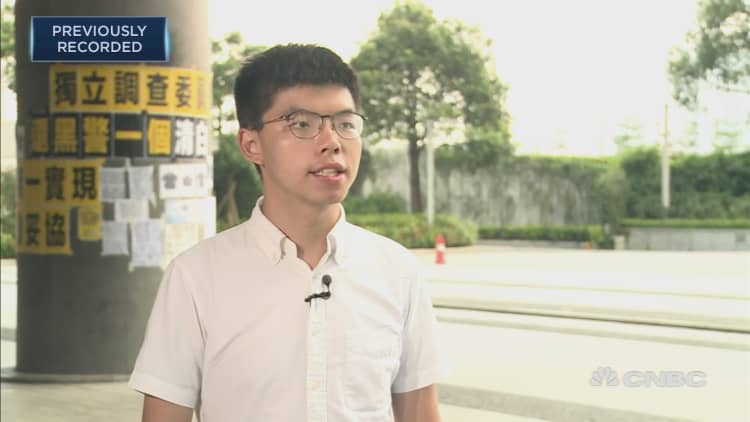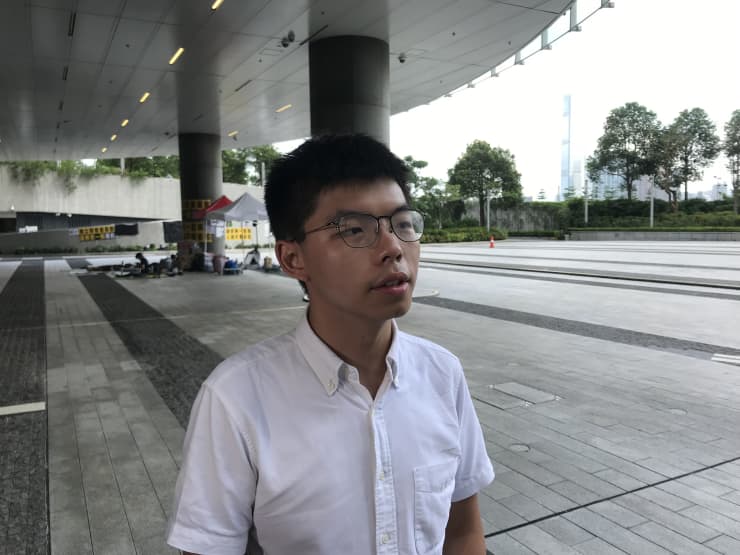- Joshua Wong called on G-20 leaders to voice concerns over the Chinese territory’s waning freedoms at their summit in Japan.
- “It’s a must for world leaders to share their concern,” Wong, who rose to prominence during 2014 protests for broader democracy in Hong Kong, told CNBC.
- Huge protests this month have shaken the Asian business and finance center on increasing worries over growing mainland Chinese influence in the former British colony of 7.4 million people.
By Kelly Olsen

It’s time for world leaders to keep their eyes on Hong Kong: Joshua Wong.
Prominent Hong Kong pro-democracy activist Joshua Wong said Friday that G-20 leaders meeting this week in Japan can help protect the city’s freedoms by raising their concerns with Chinese dictator Xi Jinping.
Protests this month, some massive in scale, have shaken the Asian business and finance center on increasing worries over what many see as growing mainland Chinese influence in the former British colony of 7.4 million people.
Ahead of the Group of 20 gathering on Friday and Saturday in Osaka, Japan, Hong Kong activists have tried to use the meeting to draw attention to Hong Kong, holding rallies and taking out ads in prominent global newspapers.
“It’s a must for world leaders to share their concern,” Wong said, urging U.S. President Donald Trump and others to follow the lead of Japanese Prime Minister Shinzo Abe, who appeared to obliquely reference the situation in Hong Kong in a meeting with the Chinese leader on Thursday as relations between Asia’s two biggest economies continue to improve.
Abe told Xi of Japan’s support for an “open and free” Hong Kong under the “one country, two systems” set-up, Japan’s Mainichi Shimbun newspaper reported.
A senior Chinese foreign ministry official had said Monday that China would not allow Hong Kong to be brought up at the G-20.
“It’s not only related to political freedom but also related to economic freedom that’s being strongly eroded by Beijing,” the 22-year-old Wong, secretary-general of local pro-democracy group Demosisto, told Chery Kang on CNBC’s “Squawk Box.”
Wong rose to prominence in 2014 during Hong Kong protests known as the Umbrella Movement that called for broader democracy.
On Friday, he said that the territory’s status as an international financial center must be maintained to ensure a stable business environment.

Hong Kong pro-democracy activist Joshua Wong speaks with CNBC on June 28, 2019 in Hong Kong.
A legal change put forward this year by the Hong Kong government to allow criminal extraditions to China was the spark for the protest movement, but at its core lie years of mounting frustration over waning local autonomy.
Fierce opposition to the proposed legislation, which opponents, including business groups, feared could expose people in Hong Kong to China’s politically controlled courts, forced the city’s top official, Chief Executive Carrie Lam, to indefinitely shelve the plan.

Hong Kong pro-democracy activist Joshua Wong speaks with CNBC on June 28, 2019 in Hong Kong.
A legal change put forward this year by the Hong Kong government to allow criminal extraditions to China was the spark for the protest movement, but at its core lie years of mounting frustration over waning local autonomy.
Fierce opposition to the proposed legislation, which opponents, including business groups, feared could expose people in Hong Kong to China’s politically controlled courts, forced the city’s top official, Chief Executive Carrie Lam, to indefinitely shelve the plan.
And while refusing protesters' demands to step down and entirely withdraw the legislation, she has publicly apologized and acknowledged it is unlikely to be resubmitted for debate.
‘Make their decision’
Hong Kong, a former British colony, on July 1, 1997 became a special administrative region of the People’s Republic of China under a “one country, two systems” framework, with the territory’s legal system independent from the rest of China.
It was guaranteed a high degree of control over its own affairs, including managing its economy and currency.
Aside from concerns about closer legal ties to China, calls for increased democracy are growing prominent in the protests.
Politically, Hong Kong has its own legislature, but the chief executive is not directly elected and only candidates acceptable to the central government in Beijing are eligible for the role.
Wong, who was released earlier this month after serving a brief prison term related to the 2014 protests, said people in Hong Kong want to freely elect their leader, calling the position “just a puppet of Beijing, serving the interests of (the) communist regime.”
Speaking ahead of the anniversary Monday of Hong Kong’s return to China, Wong renewed a call for direct elections for chief executive, expressing the hope that an annual demonstration that takes place on the day will see another large turnout.
“It’s time for Carrie Lam and the leader of Beijing to make their decision,” Wong said.
Lam’s office had no specific comment on Wong’s remarks, instead referring CNBC to her previous responses to media questions, most recently at a press conference on June 18.
Aucun commentaire:
Enregistrer un commentaire